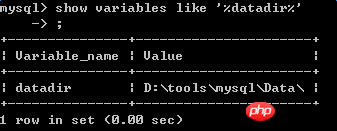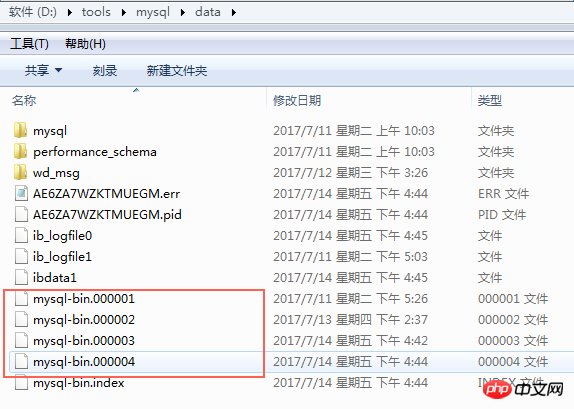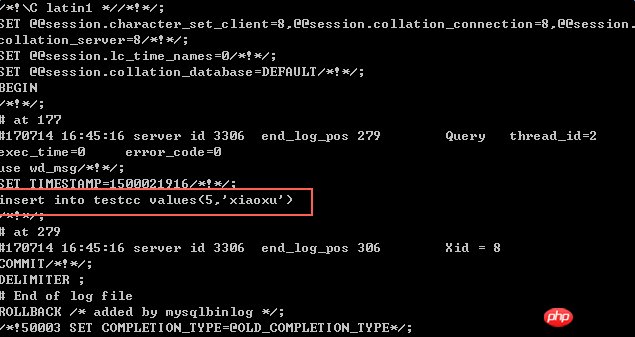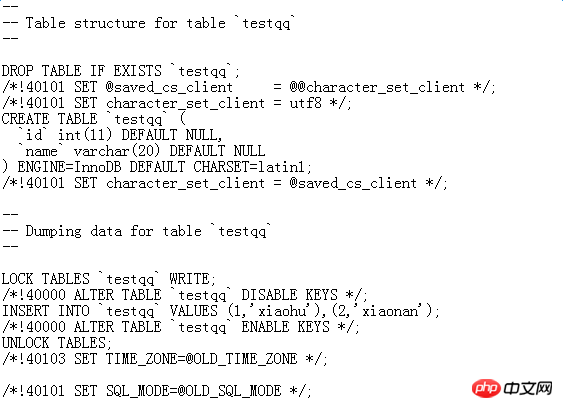Detailed explanation of MYSQL logs and backup and restore
This article mainly introduces the MYSQL log and backup and restore issues in detail. It has certain reference value. Interested friends can refer to it. I hope it can help everyone.
This article shares MYSQL logs and backups and restores for your reference. The specific content is as follows
1. Error log
When the database appears When any failure makes it unusable, check the log as soon as possible
1. Information during server startup and shutdown
2. Error information during server operation
Log storage path, you can view it through the command:

Log file naming format: host_name.err

2. Binary log
Also known as BINLOG, records all DDL statements and DML statements, excluding query statements. Not only is this log very important, but as a developer I also love this log. As can be seen from its definition, this log records all events that change the table structure and table data, so once the data is deleted accidentally or is lost due to other reasons, we can recover the data through this log. Don't you think it's cool?
Log storage path: in the same directory as the error log
Naming method: The default method is hostname-bin + number
mysql will be used every time it starts or flushes the log Generate a new binlog, with the number starting from 1 and increasing. When a single log reaches a certain size, new files are also generated.
1. Turn on the binlog recording switch
In the installation directory of myslq, there is a configuration file: my.ini

innodb_buffer_pool_size=107M # Size of each log file in a log group. You should set the combined size # of log files to about 25%-100% of your buffer pool size to avoid # unneeded buffer pool flush activity on log file overwrite. However, # note that a larger logfile size will increase the time needed for the # recovery process. innodb_log_file_size=54M # Number of threads allowed inside the InnoDB kernel. The optimal value # depends highly on the application, hardware as well as the OS # scheduler properties. A too high value may lead to thread thrashing. innodb_thread_concurrency=10 log-bin=mysql-bin
where log-bin indicates that the switch is on, and mysql-bin is the prefix of the log name.

#2. How to view BINLOG
Because it is a binary file, it cannot be viewed directly like the error log. You need to use mysql Tools provided: mysqlbinlog


3. View BINLOG
 by time
by time

One thing to note when querying by time is that start-datetime is a closed interval and stop-datetime is an open interval, so if you need to query the all-day log, you need Defined as:
--start-datetime="2017/07/12 00:00:00" --stop-datetime="2017/07/13 00:00:00": The time range of this query is 7 /12 00:00:00 - 7/12 24:59:59
3. Data backup
Data backup is actually to use the tool mysqldump provided by msyql to transfer data Back up to the specified file in the specified directory.
1. Back up the specified database or some tables in the database
mysqldump [option] db_name [table_names]
2. Back up one or more specified databases
mysqldump [option] --database db_name1 db_name2
3. Back up all databases
mysqldump [option] -all -databases
Change the port to 3306 The table structure and table data in the database wd_msg in the database instance are exported to the cd.sql file

The contents of the cd.sql file are as follows;

This file records DML statements and DDL statements, except query-related operations. During data recovery, these statements can be executed one by one to complete the data restoration.
4. Data recovery
We delete the table and re-import the data just exported:


The following scenario is to restore the wd_msg database in another mysql instance with port 3307 on the same server

The backup and restore of Mysql is for Different scenarios have different choices. Here is just one of the concepts introduced. There will be articles to introduce it in detail later.
Related recommendations:
Sample code sharing that explains the details of the MySQL log system
Introduction to mysql log recovery data method
MySQL log setting optimization
The above is the detailed content of Detailed explanation of MYSQL logs and backup and restore. For more information, please follow other related articles on the PHP Chinese website!

Hot AI Tools

Undresser.AI Undress
AI-powered app for creating realistic nude photos

AI Clothes Remover
Online AI tool for removing clothes from photos.

Undress AI Tool
Undress images for free

Clothoff.io
AI clothes remover

Video Face Swap
Swap faces in any video effortlessly with our completely free AI face swap tool!

Hot Article

Hot Tools

Notepad++7.3.1
Easy-to-use and free code editor

SublimeText3 Chinese version
Chinese version, very easy to use

Zend Studio 13.0.1
Powerful PHP integrated development environment

Dreamweaver CS6
Visual web development tools

SublimeText3 Mac version
God-level code editing software (SublimeText3)

Hot Topics
 1387
1387
 52
52
 How to open phpmyadmin
Apr 10, 2025 pm 10:51 PM
How to open phpmyadmin
Apr 10, 2025 pm 10:51 PM
You can open phpMyAdmin through the following steps: 1. Log in to the website control panel; 2. Find and click the phpMyAdmin icon; 3. Enter MySQL credentials; 4. Click "Login".
 MySQL: An Introduction to the World's Most Popular Database
Apr 12, 2025 am 12:18 AM
MySQL: An Introduction to the World's Most Popular Database
Apr 12, 2025 am 12:18 AM
MySQL is an open source relational database management system, mainly used to store and retrieve data quickly and reliably. Its working principle includes client requests, query resolution, execution of queries and return results. Examples of usage include creating tables, inserting and querying data, and advanced features such as JOIN operations. Common errors involve SQL syntax, data types, and permissions, and optimization suggestions include the use of indexes, optimized queries, and partitioning of tables.
 How to use single threaded redis
Apr 10, 2025 pm 07:12 PM
How to use single threaded redis
Apr 10, 2025 pm 07:12 PM
Redis uses a single threaded architecture to provide high performance, simplicity, and consistency. It utilizes I/O multiplexing, event loops, non-blocking I/O, and shared memory to improve concurrency, but with limitations of concurrency limitations, single point of failure, and unsuitable for write-intensive workloads.
 MySQL's Place: Databases and Programming
Apr 13, 2025 am 12:18 AM
MySQL's Place: Databases and Programming
Apr 13, 2025 am 12:18 AM
MySQL's position in databases and programming is very important. It is an open source relational database management system that is widely used in various application scenarios. 1) MySQL provides efficient data storage, organization and retrieval functions, supporting Web, mobile and enterprise-level systems. 2) It uses a client-server architecture, supports multiple storage engines and index optimization. 3) Basic usages include creating tables and inserting data, and advanced usages involve multi-table JOINs and complex queries. 4) Frequently asked questions such as SQL syntax errors and performance issues can be debugged through the EXPLAIN command and slow query log. 5) Performance optimization methods include rational use of indexes, optimized query and use of caches. Best practices include using transactions and PreparedStatemen
 Why Use MySQL? Benefits and Advantages
Apr 12, 2025 am 12:17 AM
Why Use MySQL? Benefits and Advantages
Apr 12, 2025 am 12:17 AM
MySQL is chosen for its performance, reliability, ease of use, and community support. 1.MySQL provides efficient data storage and retrieval functions, supporting multiple data types and advanced query operations. 2. Adopt client-server architecture and multiple storage engines to support transaction and query optimization. 3. Easy to use, supports a variety of operating systems and programming languages. 4. Have strong community support and provide rich resources and solutions.
 Monitor Redis Droplet with Redis Exporter Service
Apr 10, 2025 pm 01:36 PM
Monitor Redis Droplet with Redis Exporter Service
Apr 10, 2025 pm 01:36 PM
Effective monitoring of Redis databases is critical to maintaining optimal performance, identifying potential bottlenecks, and ensuring overall system reliability. Redis Exporter Service is a powerful utility designed to monitor Redis databases using Prometheus. This tutorial will guide you through the complete setup and configuration of Redis Exporter Service, ensuring you seamlessly build monitoring solutions. By studying this tutorial, you will achieve fully operational monitoring settings
 How to view sql database error
Apr 10, 2025 pm 12:09 PM
How to view sql database error
Apr 10, 2025 pm 12:09 PM
The methods for viewing SQL database errors are: 1. View error messages directly; 2. Use SHOW ERRORS and SHOW WARNINGS commands; 3. Access the error log; 4. Use error codes to find the cause of the error; 5. Check the database connection and query syntax; 6. Use debugging tools.
 How to connect to the database of apache
Apr 13, 2025 pm 01:03 PM
How to connect to the database of apache
Apr 13, 2025 pm 01:03 PM
Apache connects to a database requires the following steps: Install the database driver. Configure the web.xml file to create a connection pool. Create a JDBC data source and specify the connection settings. Use the JDBC API to access the database from Java code, including getting connections, creating statements, binding parameters, executing queries or updates, and processing results.




